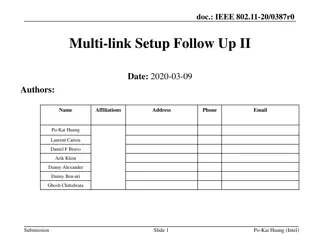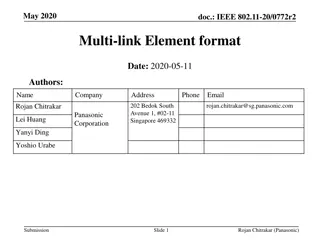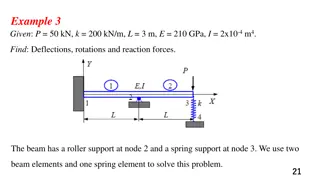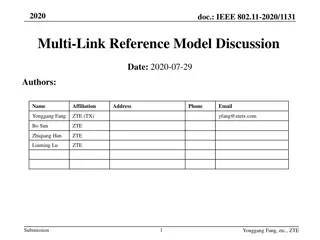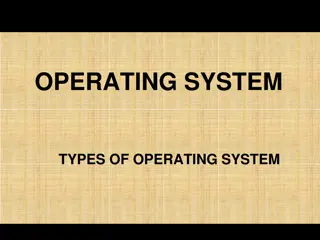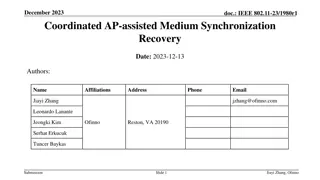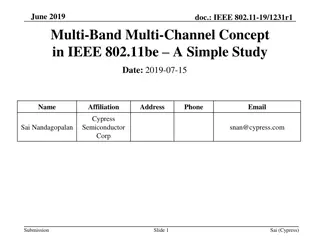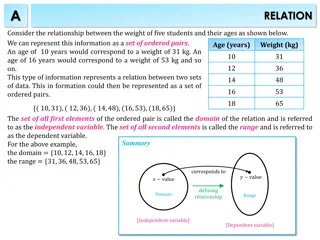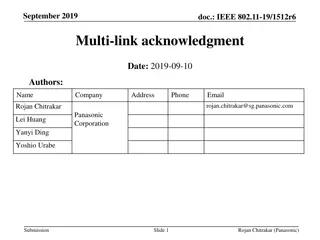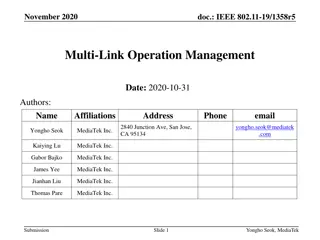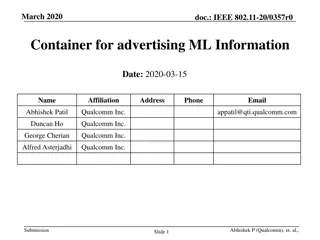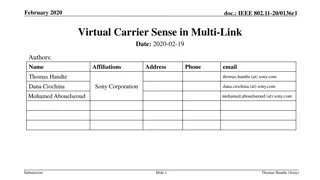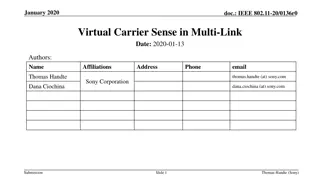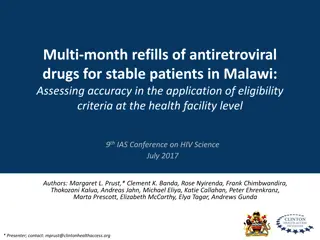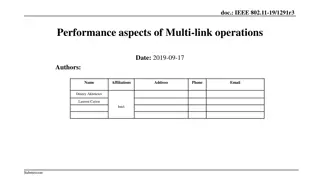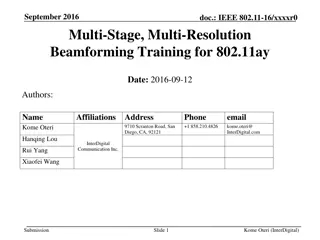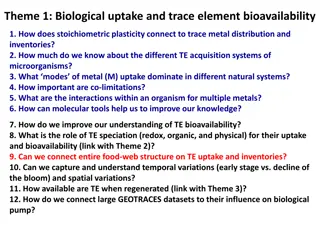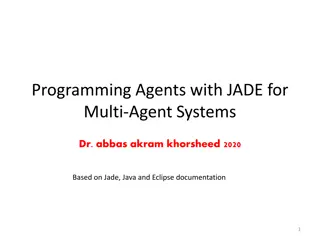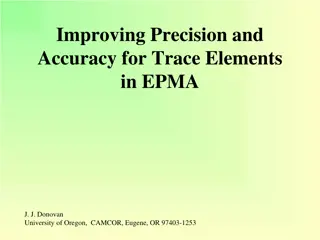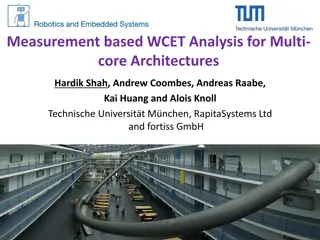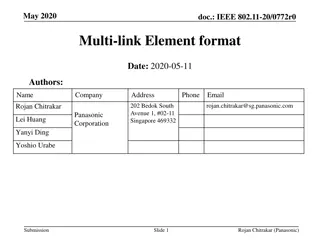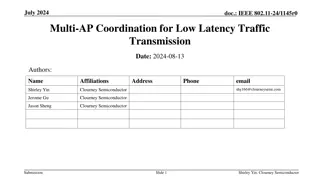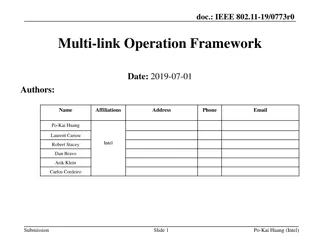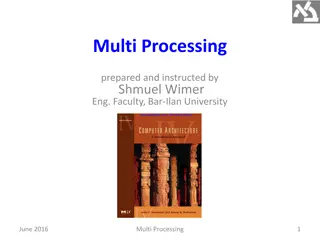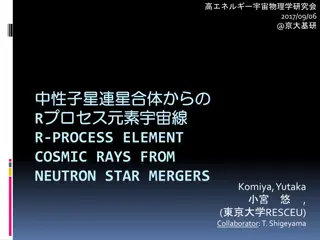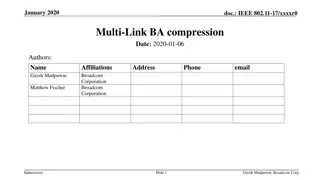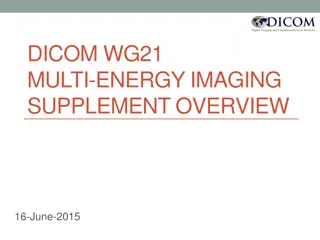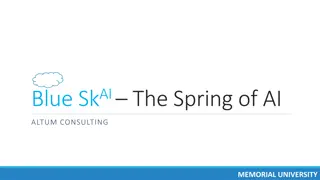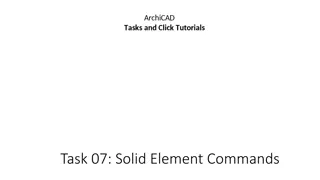Progress on IEEE 802.11 Multi-link Setup
Significant developments have been made in the multi-link setup within the IEEE 802.11 framework. The focus is on allowing only one STA in the MLD framework, differentiation with STA-level associations, and the rationale behind restricting to one STA. Proposals for defining multi-link devices and re
0 views • 12 slides
Brown Act Basics for Housing Element Working Group
The Housing Element Working Group held a meeting on May 6, 2021, focusing on key topics such as Introduction to Brown Act, Housing Element 101, Working Group Processes, and Election of Co-Chairs. Housekeeping items were highlighted, emphasizing clear communication and technological flexibility. The
0 views • 37 slides
IEEE 802.11-20/0772r2 Multi-Link Elements Overview
IEEE 802.11-20/0772r2 discusses various aspects of multi-link elements in the context of IEEE 802.11 standards. The document covers the need for efficient element ID extension, different multi-link element structures, including authentication algorithms, common controls, and sub-elements organizatio
1 views • 10 slides
Engineering Beam Analysis using Finite Element Method
Solve beam analysis problems involving deflections, rotations, and reaction forces using the finite element method. The examples provided cover scenarios with roller supports, spring supports, and internal hinges. Learn how to determine displacements, rotations, and element forces in beams of varyin
0 views • 42 slides
Understanding Multi-AP Operation in IEEE 802.11-20-0617/r3
Explore the basic definitions and key features of Multi-AP operation in the IEEE 802.11 standard. Learn about Multi-AP Candidate Set (M-AP-CS) and Multi-AP Operation Set (M-AP-OS) along with their participants and formation. Delve into the concepts of Coordinator AP, Coordinated AP(s), and reliable
0 views • 19 slides
IEEE 802.11-2020 Multi-Link Reference Model Discussion
This contribution discusses the reference model to support multi-link operation in IEEE 802.11be and proposes architecture reference models to support multi-link devices. It covers aspects such as baseline architecture reference models, logical entities in different layers, Multi-Link Device (MLD) f
1 views • 19 slides
Understanding Different Types of Operating Systems
An operating system is the crucial program that manages a computer's resources and acts as an interface between the user and the machine. Various types of operating systems exist, including real-time, multi-user vs. single-user, multi-tasking vs. single-tasking, distributed, and embedded systems. Re
1 views • 11 slides
IEEE 802.11-23/1980r1 Coordinated AP-assisted Medium Synchronization Recovery
This document from December 2023 discusses medium synchronization recovery leveraging multi-AP coordination for multi-link devices. It covers features such as Multi-link device (MLD), Multi-link operation (MLO), and Ultra High Reliability (UHR) capability defined in P802.11bn for improvements in rat
0 views • 8 slides
Understanding Multi-Band Multi-Channel Concept in IEEE 802.11be
Exploring the benefits of Multi-Band Multi-Channel (MBMC) operation in IEEE 802.11be, this study delves into the efficient use of spectrum, increased data rates, and network load balancing. It also discusses the envisioned usage models and compares Single Band Operation with Multi-Band Operation, hi
1 views • 20 slides
Understanding Multi-Band, Multi-Channel Concept in IEEE 802.11be
Explore the advantages of Multi-Band, Multi-Channel (MBMC) operation in IEEE 802.11be, focusing on efficient spectrum use, increased data rates, and dynamic band switching. Learn about usage models and compare with single-band operations. Discover how MBMC enables concurrent operation across multipl
0 views • 22 slides
Understanding Relations and Functions in Mathematics
A relation is a correspondence between two sets where each element in the first set (domain) corresponds to at least one element in the second set (range). Functions are special relations where each element in the domain has a unique correspondence in the range. Surjective functions map the entire r
0 views • 12 slides
Enhancing IEEE 802.11 with Multi-Link Acknowledgment Mechanism
This document explores the concept of multi-link transmission in IEEE 802.11 networks as a means to enhance peak throughput. It delves into the proposal of a multi-link block acknowledgment mechanism for more efficient data transmission. The discussion includes details on existing block acknowledgme
0 views • 16 slides
IEEE 802.11-20/0370r0 Multi-link Power Save Discussion
The document discusses multi-link power saving in the IEEE 802.11be standard. It reviews extreme low power multi-link operation modes, emphasizing the importance of enabling a single link for practical power savings. The proposed extreme low power mode introduces fixed and dynamic anchor links for e
0 views • 11 slides
IEEE 802.11-19/1358r5 Multi-Link Operation Management Overview
This document provides insights into the multi-link operation management proposed for IEEE 802.11-19/1358r5 standard by MediaTek Inc. The concept involves handling multi-link entities, such as APs and STAs, for improved performance in different environments. It discusses the architecture, motivation
0 views • 15 slides
Framework for Advertising Multiple-Link Operations in IEEE 802.11
Proposed framework for advertising Multiple-Link Operations (MLO) capabilities in IEEE 802.11 networks classified into three categories: Common MLD Information, Per-Link Information, and Multiple BSSID features. Introduces a new element, Multiple Link Attribute (MLA) element, with profiles for each
0 views • 27 slides
Understanding the Periodic Table: Atomic Structure and Element Classification
Explore the fundamental concepts of the periodic table, including how to locate atomic numbers and masses, identify element groups, understand group and period distinctions, and analyze element properties. Delve into historical perspectives from scientists like D. Bereiner and Mendeleev, and grasp t
0 views • 38 slides
Virtual Carrier Sense in Asynchronous Multi-Link Networks
Exploring the implementation of virtual carrier sense in asynchronous multi-link networks based on IEEE 802.11 standards. The presentation discusses the benefits of using NAV (Network Allocation Vector) in asynchronous multi-link setups to avoid hidden node issues, improve throughput, and latency. I
0 views • 16 slides
Virtual Carrier Sense in Multi-Link Networks
This document discusses the implementation and advantages of virtual carrier sense in multi-link networks under the IEEE 802.11 standard. It explores the operation of multi-link setups, asynchronous communication benefits, and the necessity of multiple contention channels. The concept of NAV (Networ
2 views • 11 slides
Accuracy of Multi-Month Refills of Antiretroviral Drugs in Malawi
Understanding the implementation of multi-month refills for stable patients in Malawi provides valuable insights into patient eligibility differentiation, with 86% eligible for multi-month scripts. Challenges remain in accurately applying eligibility criteria, as seen in the study's findings. The re
0 views • 13 slides
Understanding Multi-Skill Arithmetics: Insights and Challenges
Delve into the intricacies of multi-skill operations in the webinar presented by Ger Koole, PhD. Explore the advantages and complexities, learn rules of thumb for multi-skill calculations, and understand the trade-offs involved in managing multi-skilled teams efficiently.
0 views • 11 slides
Performance Aspects of Multi-link Operations in IEEE 802.11-19/1291r0
This document explores the performance aspects, benefits, and assumptions of multi-link operations in IEEE 802.11-19/1291r0. It discusses the motivation for multi-link operation in new wireless devices, potential throughput gains, classification of multi-link capabilities, and operation modes. The s
0 views • 30 slides
Performance Aspects of Multi-link Operations in IEEE 802.11-19/1291r3
This document discusses the motivation, assumptions, and classifications related to multi-link operations in IEEE 802.11-19/1291r3 standard. It explores the benefits of multi-link capabilities in new wireless devices, such as improved throughput, reduced latency, and potential for link aggregation.
0 views • 18 slides
Multi-Stage, Multi-Resolution Beamforming Training for IEEE 802.11ay
In September 2016, a proposal was introduced to enhance the beamforming training procedures in IEEE 802.11ay for increased efficiency and MIMO support. The proposal suggests a multi-stage, multi-resolution beamforming training framework to improve efficiency in scenarios with high-resolution beams a
0 views • 11 slides
Understanding Biological Uptake of Trace Elements in Natural Systems
Explore the connection between stoichiometric plasticity and trace metal distribution, investigate microbial acquisition systems, analyze modes of metal uptake, and address co-limitations and interactions within organisms. Utilize molecular tools to enhance knowledge on trace element bioavailability
0 views • 5 slides
Programming Agents with JADE for Multi-Agent Systems Overview
This overview delves into the setup of JADE framework for developing multi-agent systems. It covers essential components, setting up the development environment, installing JADE and Eclipse, and a book trading example. The content explores the power of Java technology, Eclipse as an extensible devel
0 views • 51 slides
Enhancing Precision and Accuracy in Trace Element Analysis Using EPMA Techniques
This research focuses on improving precision and accuracy for trace elements through advanced methods like MAN (mean atomic number) and MPB (multi-point background). By optimizing background measurements and calibration techniques, researchers aim to enhance the sensitivity and reliability of trace
0 views • 16 slides
Measurement-based WCET Analysis for Multi-core Architectures
This research focuses on providing an inexpensive multi-core solution for safety-critical systems by utilizing unmodified production chips and measurement-based WCET analysis tools. The goal is to enable WCET analysis on multi-core setups while preserving cost, performance, and time-to-market benefi
0 views • 25 slides
Proposal for Common Multi-link Element in IEEE 802.11-20/0772r0
Various multi-link elements have been proposed in IEEE 802.11 standards, leading to potential space limitations. The proposal suggests a common multi-link element with a Type field to distinguish different usages efficiently, potentially streamlining multi-link operations without unnecessary complex
0 views • 9 slides
Biologically Important Evening Element in Promoter Regions: Insights from Research by Leila Shokat
The research explores the significance of the Evening Element as a motif in gene promoter regions regulated by CCA1. Understanding the importance of motif positions in promoters reveals insights into gene regulation and biological relevance. The study highlights the relevance of consistent motif pos
0 views • 6 slides
Update on Alameda County Community Development Agency Planning Projects
Alameda County Community Development Agency Planning Department's update on general plan projects focusing on the Housing Element, Environmental Justice Element, and Safety Element. The General Plan is required by State Law, with specific elements such as Land Use, Circulation, Open Space, Conservat
0 views • 25 slides
Multi-AP Coordination for Low Latency Traffic Transmission
The document discusses the integration of multi-access point (AP) coordination to enhance the transmission of low-latency traffic in wireless networks. It addresses the challenges and introduces modes of operation capable of reducing latency and improving reliability for low-latency (LL) traffic tra
0 views • 9 slides
IEEE 802.11-19/0773r0 Multi-link Operation Framework Summary
The document discusses the multi-link operation framework for IEEE 802.11-19/0773r0, focusing on load balancing and aggregation use cases. It introduces terminology related to multi-link logical entities and provides examples of multi-link AP and non-AP logical entities. The framework considers stee
0 views • 16 slides
Understanding Multi-Processing in Computer Architecture
Beginning in the mid-2000s, a shift towards multi-processing emerged due to limitations in uniprocessor performance gains. This led to the development of multiprocessors like multicore systems, enabling enhanced performance through parallel processing. The taxonomy of Flynn categories, including SIS
0 views • 46 slides
Understanding Multi-morbidity and Deprivation in UK General Practice
Exploring the association between multi-morbidity, deprivation, and life expectancy in the context of UK general practice. The research aims to quantify socio-economic inequalities in chronic disease onset and life expectancy, particularly among older populations with multi-morbidity. Methods includ
0 views • 27 slides
Neutron Star Mergers and Ultra Heavy Element Cosmic Rays: Exploring Their Connection
Delve into the intriguing link between neutron star mergers and the synthesis of ultra heavy element cosmic rays. The rapid neutron capture process, known as r-process, plays a crucial role in creating elements heavier than iron through events like neutron star mergers and core-collapse supernovae.
0 views • 19 slides
IEEE 802.11-17: Enhancing Multi-Link Operation for Higher Throughput
The document discusses IEEE 802.11-17/xxxxr0 focusing on multi-link operation for achieving higher throughput. It covers motions adopted in the SFD related to asynchronous multi-link channel access, mechanisms for multi-link operation, and shared sequence number space. Additionally, it explores the
0 views • 14 slides
Overview of DICOM WG21 Multi-Energy Imaging Supplement
The DICOM WG21 Multi-Energy Imaging Supplement aims to address the challenges and opportunities in multi-energy imaging technologies, providing a comprehensive overview of imaging techniques, use cases, objectives, and potential clinical applications. The supplement discusses the definition of multi
0 views • 33 slides
Navigating Challenges in the AI Industry: Element AI Analysis and Recommendations
In this presentation, the team explores the growth trajectory of Element AI amidst hurdles in the industry. They discuss key issues, objectives, and provide a recommendation for Element AI to establish a North American AI conglomerate. The analysis delves into the AI industry overview, challenges of
0 views • 40 slides
ArchiCAD Tutorial: Solid Element Commands for Wall and Roof Design
Learn how to create a wall structure and add a gable roof in ArchiCAD using solid element commands. Follow step-by-step instructions with detailed images to design a multi-story building with precision and efficiency.
0 views • 10 slides
Understanding the Housing Element Update in West Hollywood
Explore the Housing Element Update in West Hollywood, covering topics like the planning process, regional housing needs assessment, current housing trends, and future steps. Learn about the significance of the Housing Element, its requirements under state law, and the key aspects of the 2013-2021 pl
0 views • 36 slides
